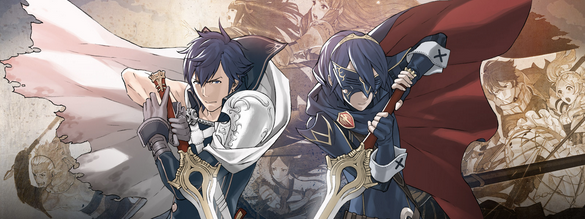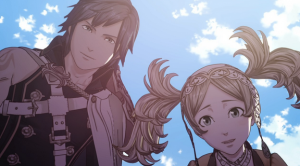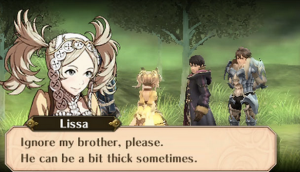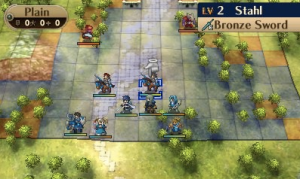[Opinion] The frustrating (and oft-ignored) imperfections of Fire Emblem: Awakening (Part 1)

Author: Austin
The time has probably long since past during which a review of Fire Emblem: Awakening would have been suitable, so instead of going through the paces of telling you what you need to know in order to make an informed decision about whether or not to purchase the game, I’ll start off here with this: It’s probably the best game on 3DS, and even those with a distaste for the franchise’s previous entries will find something to like about it. If you haven’t played the game yet, please do so before reading what I’m about to write, because what I’m about to write will be filled with minor spoilers and negative thoughts about a game that is best played before hearing either of those things!
This is part one of a two or three part series on Awakening in which I’ll be doing my best to intelligently discuss some of the finer points of the game. These are things that everyone I’ve talked to has neglected to mention exist, either out of blind adoration for the title (which is fine– everyone gets that way about some games), or because they simply didn’t notice them.
Hit the break for the actual thing.

I think the entire point of the whole Fire Emblem “thing” is based around the perma-death mechanic. Not from a difficulty perspective mind you, but on the basis of storytelling. If you’ve decided to read this opinionated editorial without playing Awakening (despite my warning in the paragraph prior), first of all, stop reading after this sentence, and second of all, play the game on Classic Mode.
So I hear the cries of a lot of gamers (many of them Fire Emblem newcomers like myself) saying that Classic Mode is the lesser of the two modes in Awakening because it forces you to restart when you lose valuable characters, it upsets you when said valuable characters die, and it makes you feel like you’re wasting resources leveling people up when they could kick the bucket at any minute. All of these things are true, but let me make a comparison: I liken neglecting to play a Fire Emblem game with perma-death to watching a special version of Lord of the Rings or Star Wars where no one is in any danger of dying except the bad guys.
It’s certainly not a very gripping tale if no one is in any danger, is it? No it is not.
Oddly enough, herein lies the massive problem I have with Fire Emblem: Awakening: Half of the characters just don’t die. When an enemy weapon connects with a certain selection of your comrades and drains the remainder of their life, they opt to “retire” instead of dying, retreating from the battlefield to go on to do better things instead of giving their life in a glorious display of emotional heartbreak.
It’s certainly not a very gripping tale if no one is in any danger, is it? No it is not!

There are certain circumstances in which this is more frustrating than others. For example, in one of the final battles of the game I was fighting alongside my in-game wife– a lovely lady named Lissa– and I miscalculated the enemy’s power. This put Lissa in a position to be killed. It was extremely tense watching her dodge attacks, watching my character block attacks for her, watching as her HP dropped bit by bit as more attacks began to hit their target– but eventually she couldn’t dodge or block or sustain any more damage. She was killed by an axe, my character– her husband, no less– by her side. She even said something to the effect of “I can’t go on… I’m sorry… This war is over for me… I’m sorry…” before her avatar faded from the screen and her abilities ceased to be available to me. I felt, at the risk of sounding a little too involved with my games, positively heartbroken.
So imagine how I felt when in the next cutscene she just shows up out of nowhere, says a line as if nothing happened, and then the story carries on as though death is simply a casual and temporary setback in the world of Fire Emblem. I had just gone through an extremely emotionally gratifying battle where my character had to finish an important objective despite losing his lover, and then she just returned out of the blue to say her completely unnecessary line. And the fact that it was unnecessary makes it an even bigger issue.
It’s not as though she ended up playing a particularly useful role in the story there-forward. I could forgive one or two character “retirements” if they came back later and served a meaningful purpose in the story that could not have been achieved without them, but after my wife’s “death” she said a total of four lines before the end of the game, none of which were even remotely important. I had gone through all of this frustrating, immersion-shattering nonsense for seemingly no reason other than developmental oversight.
And this certainly wasn’t the only case where this happened. I’m not particularly good at Fire Emblem, so I lose a lot of friends along the way (which, due to perma-death, gets me to really hate the antagonists– it makes for a much better story). Of the 37 total playable characters I had interactions with, I lost 27 in battle. Of the 27 I lost in battle, 12 of them actually died. The other 15 claimed to “retire”, and yet of those 15 only two actually played an even moderately important role in the story. The majority of the other 13 never even appeared again, and the few who did appear didn’t say a single thing that couldn’t have been outright deleted with very little need to modify the other characters’ dialogue.

Of course, one could make the somewhat-sound argument that the narrative difference between whether a character “dies” or “retreats” isn’t very important because ultimately they suffer what is known in quality game storytelling as a “gameplay death”. The ‘gameplay death’ (as well as similar, non-death related mechanics) is part of the reason why so many people consider video games to be such an effective medium of storytelling, and I would absolutely agree. When a character’s death has not only an impact on the outcome of the story but also the ease with which you can play the game, its ability to elicit an emotional reaction from the player increases dramatically. As though in real war, losing a comrade means the battles are more lonely, more difficult, and more intense, which is an effect that can only be achieved indirectly through non-game mediums. A game, uniquely, gives the player direct emotional access to a situation.
So why does the “narrative retreat” matter if the “gameplay death” is so powerful regardless? I shall return to my comparison to movies to explain: When someone dies in a movie– say, Borimir in Lord of the Rings, to draw the same comparison I did earlier– every single tool that the movie has at its disposal is being used to clue you in on the impact of that death. The music changes, the camera angles change, the characters scream or cry or cheer, the sound shifts in tone or effect– the film is firing on all cylinders to make sure the viewers are experiencing exactly what that death should mean, as best as the director can manage.
When a character dies in Fire Emblem it often it works in the same way. The only difference is that, being a videogame, it has one more cylinder with which to fire– one more tool to use in its storytelling. The problem is that Awakening in particular doesn’t always work this way, relating back to the aforementioned death of my wife. If the music, the sound effects, the gameplay, and the visuals all scream “sad death!” but the character’s dialogue says “death? what are you talking about?”, the immersion is broken, the veil lifted, and the drama smothered. It is, plain and simple, bad story-telling. And it becomes unbearably frustrating to watch as a piece of work so well set up for the top tier of emotional effectiveness falls so flat for such pointless reasons.

To reiterate, I truly loved Fire Emblem: Awakening. I would not hesitate to recommend it to anyone with even a passing interest in serious video games, and I plan playing through it again multiple time– something I do very rarely with games. If you read this piece before playing the game (first of all, “nooooo!”) and you’re finding yourself doubting your future purchase, do yourself a favor and just buy the game. It’s truly worth experiencing multiple times.
Just be aware that there are a few minor niggles to be had.